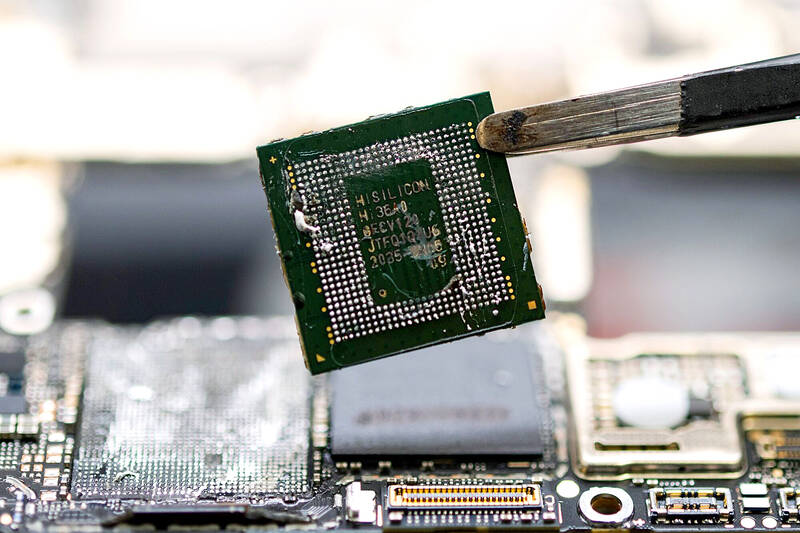Taiwan has blacklisted Huawei Technologies Co (華為) and Semiconductor Manufacturing International Corp (SMIC, 中芯), dealing another major blow to the two companies spearheading China’s efforts to develop cutting-edge artificial intelligence (AI) chip technologies.
The Ministry of Economic Affairs’ International Trade Administration has included Huawei, SMIC and several of their subsidiaries in an update of its so-called strategic high-tech commodities entity list, the latest version on its Web site showed on Saturday.
It did not publicly announce the change.

Photo: Bloomberg
Other entities on the list include organizations such as the Taliban and al-Qaeda, as well as companies in China, Iran and elsewhere.
Local companies need approval from the government before they can ship anything to users on the entity list, according to regulations.
In 2023, Bloomberg News reported that several Taiwanese companies were helping Huawei build infrastructure for an under-the-radar network of chip plants across southern China.
The new restrictions are likely to, at least partially, cut off Huawei and SMIC’s access to Taiwan’s plant construction technologies, materials and equipment essential to building AI semiconductors, such as those made by Taiwan Semiconductor Manufacturing Co (TSMC, 台積電) for the likes of Nvidia Corp.
In Huawei’s case, several of its overseas units, including in Japan, Russia and Germany, were also captured in the update to the entity list. Huawei and SMIC — and some of their subsidiaries — are also on the US entity list, which has significantly limited the companies’ ability to acquire foreign technology.
While Taiwan has for years imposed certain blanket bans on the shipments of critical chipmaking equipment, including lithography machines, to China, it has not included leading Chinese tech companies or chipmakers on its entity list previously. TSMC, the go-to chipmaker for Apple Inc and Nvidia, cut off its supplies to Huawei in 2020 because of US export controls.
Huawei, together with SMIC, shocked US politicians in 2023 by releasing an advanced, made-in-China 7-nanometer chip. While the two are struggling to improve their technologies due to various curbs, they are still China’s best hope to help fill in the AI chip gap left by a lack of Nvidia’s most sophisticated semiconductors.
Tensions between Taiwan and China also stepped up a notch earlier this year after President William Lai (賴清德) labeled China a “foreign hostile force” for the first time and unveiled wide-ranging measures to counter infiltration efforts.

CHAOS: Iranians took to the streets playing celebratory music after reports of Khamenei’s death on Saturday, while mourners also gathered in Tehran yesterday Iranian Supreme Leader Ayatollah Ali Khamenei was killed in a major attack on Iran launched by Israel and the US, throwing the future of the Islamic republic into doubt and raising the risk of regional instability. Iranian state television and the state-run IRNA news agency announced the 86-year-old’s death early yesterday. US President Donald Trump said it gave Iranians their “greatest chance” to “take back” their country. The announcements came after a joint US and Israeli aerial bombardment that targeted Iranian military and governmental sites. Trump said the “heavy and pinpoint bombing” would continue through the week or as long

TRUST: The KMT said it respected the US’ timing and considerations, and hoped it would continue to honor its commitments to helping Taiwan bolster its defenses and deterrence US President Donald Trump is delaying a multibillion-dollar arms sale to Taiwan to ensure his visit to Beijing is successful, a New York Times report said. The weapons sales package has stalled in the US Department of State, the report said, citing US officials it did not identify. The White House has told agencies not to push forward ahead of Trump’s meeting with Chinese President Xi Jinping (習近平), it said. The two last month held a phone call to discuss trade and geopolitical flashpoints ahead of the summit. Xi raised the Taiwan issue and urged the US to handle arms sales to

A magnitude 5.6 earthquake struck off the coast of Yilan County at 12:37pm today, with clear shaking felt across much of northern Taiwan. There were no immediate reports of damage. The epicenter of the quake was 16.9km east-southeast of Yilan County Hall offshore at a depth of 66.8km, Central Weather Administration (CWA) data showed. The maximum intensity registered at a 4 in Yilan County’s Nanao Township (南澳) on Taiwan’s seven-tier scale. Other parts of Yilan, as well as certain areas of Hualien County, Taipei, New Taipei City, Taoyuan, Hsinchu County, Taichung and Miaoli County, recorded intensities of 3. Residents of Yilan County and Taipei received

Taiwan has secured another breakthrough in fruit exports, with jujubes, dragon fruit and lychees approved for shipment to the EU, the Ministry of Agriculture said yesterday. The Animal and Plant Health Inspection Agency on Thursday received formal notification of the approval from the EU, the ministry said, adding that the decision was expected to expand Taiwanese fruit producers’ access to high-end European markets. Taiwan exported 126 tonnes of lychees last year, valued at US$1.48 million, with Japan accounting for 102 tonnes. Other export destinations included New Zealand, Hong Kong, the US and Australia, ministry data showed. Jujube exports totaled 103 tonnes, valued at